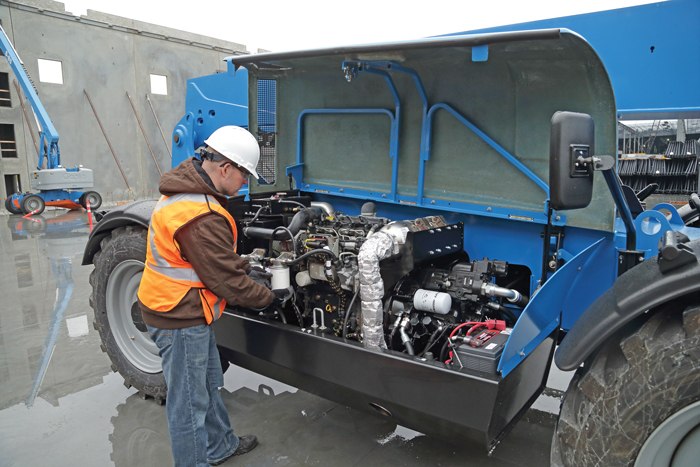
Telehandlers are incredibly versatile pieces of kit that, when looked after properly, can provide your firm with many years of service. From manoeuvring pallets around the yard to lifting workmen to those hard to reach places, their uses are many.
Now, regardless of whether your firm owns the telehandler or leases it from a company such as www.ukforks.com, to maximise its working life the machine needs to be regularly inspected and maintained. This guide offers up five useful tips for looking after your telehandler and ensuring it serves your company for years to come.

1. Carry out regular inspections
Carrying out a daily inspection of your telehandler is the most effective way to pick up signs of damage and wear and tear. The check should cover all the key components of the vehicle, including the tyres, wheel fixings, lights, body work and cab. The boom and any attachments should also be looked over for signs of damage.
These checks should be carried out by a competent person, i.e. Someone trained in telehandler operation. A daily visual inspection is usually thorough enough to pick up signs of wear and tear, but a more comprehensive check of the vehicles boom, hydraulics and drive should be carried out at least once a month.
More detailed inspections should be carried out every one to two months, covering things such as the vehicle’s electronics, fluid levels and all mechanical parts.
An annual safety inspection should also be carried out alongside the vehicle’s MOT.
By carrying out regular checks, any safety issues or maintenance points should be picked up before the annual inspection. Faults can be picked up and addressed whilst they are still relatively minor, which should save you money in the long run.
2. Keep detailed records
Detailed logs of every inspection should be kept for a number of reasons. Firstly, they provide potential buyers a detailed history of the vehicle when the time comes to sell, but also well-kept records can help you identify areas of concern and predict when certain parts are likely to require servicing.
The logs should include fields such as the date of inspection, who carried out the inspection and a description of the vehicle’s condition. Any faults, causes for concern or repair work should be logged along with any potential need for future maintenance.
3. Ensure operators are well trained
All staff responsible for operating the telehandler should hold relevant licenses and be well trained in driving and operating the vehicle. There should be a clear policy in place for the safe use of telehandlers on and off-site, which includes a separation of operational telehandlers and pedestrians. All operators should be well versed in the policy.
The operators should also be aware of the log books and instructed to record any incidents or anytime he or she comes across a potential defect or cause for concern.
4. Assess each job for suitability
Accidents happen when telehandlers are overextended or used for a job for which they are unsuitable. Each job should therefore be assessed for suitability. Things to consider are the mass and shape of the loads being lifted, the terrain over which the telehandler is expected to travel and how far the telehandler’s boom will have to extend.
Overloading the telehandler or overextending the boom when loaded can cause a potentially serious accident. Ensure you or the operator consults the load charts when assessing the suitability of your telehandler for any given job.
If the telehandler is not suitable, or even only marginally suitable, do not attempt to carry out the job. You run the risk of damaging the vehicle or causing a potentially serious accident.
5. Keep on top of maintenance jobs
Finally, it is important to keep on top of maintenance jobs as they arise. The regular inspections and record keeping should highlight to you any work that requires carrying out on the telehandler; carry them out when they are still small and inexpensive.
Avoid the temptation to put off minor maintenance as it could prove expensive in the long run. Small and regular fixes reduce the risk of a major breakdown and the costs associated with them.







